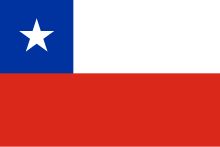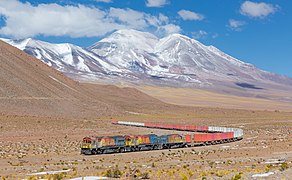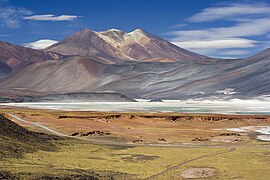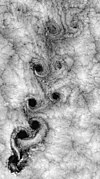Portal:Chile
| Main page | Assessment | Articles | Templates | Translation | Noticeboard | To Do List | Portal |
The Chile Portal

Chile, officially the Republic of Chile, is a country in western South America. It is the southernmost country in the world and the closest to Antarctica, stretching along a narrow strip of land between the Andes Mountains and the Pacific Ocean. With an area of 756,102 square kilometers (291,933 sq mi) and a population of 17.5 million as of 2017, Chile shares borders with Peru to the north, Bolivia to the northeast, Argentina to the east, and the Drake Passage to the south. The country also controls several Pacific islands, including Juan Fernández, Isla Salas y Gómez, Desventuradas, and Easter Island, and claims about 1,250,000 square kilometers (480,000 sq mi) of Antarctica as the Chilean Antarctic Territory. The capital and largest city of Chile is Santiago, and the national language is Spanish.
Spain conquered and colonized the region in the mid-16th century, replacing Inca rule, but failed to conquer the independent Mapuche people who inhabited what is now south-central Chile. Chile emerged as a relatively stable authoritarian republic in the 1830s after their 1818 declaration of independence from Spain. During the 19th century, Chile experienced significant economic and territorial growth, putting an end to Mapuche resistance in the 1880s and gaining its current northern territory in the War of the Pacific (1879–83) by defeating Peru and Bolivia. In the 20th century, up until the 1970s, Chile underwent a process of democratization and experienced rapid population growth and urbanization, while relying increasingly on exports from copper mining to support its economy. During the 1960s and 1970s, the country was marked by severe left-right political polarization and turmoil, which culminated in the 1973 Chilean coup d'état that overthrew Salvador Allende's democratically elected left-wing government. This was followed by a 16-year right-wing military dictatorship under Augusto Pinochet, which resulted in more than 3,000 deaths or disappearances. The regime ended in 1990, following a referendum in 1988, and was succeeded by a center-left coalition, which ruled until 2010.
Chile has a high-income economy and is one of the most economically and socially stable nations in South America, leading Latin America in competitiveness, per capita income, globalization, peace, and economic freedom. Chile also performs well in the region in terms of sustainability of the state and democratic development, and boasts the second lowest homicide rate in the Americas, following only Canada. Chile is a founding member of the United Nations, the Community of Latin American and Caribbean States (CELAC), and the Pacific Alliance, and joined the OECD in 2010. (Full article...)
Sollipulli (Spanish pronunciation: [soʝiˈpuʝi]; lit. 'reddish mountain' in the Mapuche language) is an ice-filled volcanic caldera and volcanic complex, which lies southeast of the small town of Melipeuco in the La Araucanía Region, Chile. It is part of the Southern Volcanic Zone of the Andes, one of the four volcanic belts in the Andes chain.
The volcano has evolved in close contact with glacial ice. It differs from many calderas in that Sollipulli appears to have collapsed in a non-explosive manner. The age of collapse is not yet known, but it is presently filled with ice to thicknesses of 650 m (2,130 ft). The ice drains through two glaciers in the west and the north of the caldera. Sollipulli has developed on a basement formed by Mesozoic and Cenozoic geological formations. (Full article...)Selected biography -
Augusto José Ramón Pinochet Ugarte (25 November 1915 – 10 December 2006) was a Chilean army officer and military dictator who ruled Chile from 1973 to 1990. He was the leader of the military junta from 1973 to 1981, and was declared President of the Republic by the junta in 1974 and thus became the dictator of Chile, and from 1981 to 1990 as de jure president after a new constitution which confirmed him in the office was approved by a referendum in 1980. His time in office remains the longest of any Chilean ruler.
Augusto Pinochet rose through the ranks of the Chilean Army to become General Chief of Staff in early 1972 before being appointed its Commander-in-Chief on 23 August 1973 by President Salvador Allende. On 11 September 1973,
Pinochet seized power in Chile in a military coup, with the support of the United States, that toppled Allende's democratically elected left-wing Unidad Popular government and ended civilian rule. In December 1974, the ruling military junta appointed Pinochet Supreme Head of the nation by joint decree, although without the support of one of the coup's instigators, Air Force General Gustavo Leigh. After his rise to power, Pinochet persecuted leftists, socialists, and political critics, resulting in the executions of 1,200 to 3,200 people, the internment of as many as 80,000 people, and the torture of tens of thousands. According to the Chilean government, the number of executions and forced disappearances was at least 3,095. Operation Condor, a U.S.-supported terror operation focusing on South America, was founded at the behest of the Pinochet regime in late November 1975, his 60th birthday. (Full article...)Selected article -

Chilean cuisine stems mainly from the combination of traditional Spanish cuisine, Chilean Mapuche culture and local ingredients, with later important influences from other European cuisines, particularly from Germany, the United Kingdom and France. The food tradition and recipes in Chile are notable for the variety of flavours and ingredients, with the country's diverse geography and climate hosting a wide range of agricultural produce, fruits and vegetables. The long coastline and the peoples' relationship with the Pacific Ocean add an immense array of seafood to Chilean cuisine, with the country's waters home to unique species of fish, molluscs, crustaceans and algae, thanks to the oxygen-rich water carried in by the Humboldt Current. Chile is also one of the world's largest producers of wine and many Chilean recipes are enhanced and accompanied by local wines. The confection dulce de leche was invented in Chile and is one of the country's most notable contributions to world cuisine.
Chilean cuisine shares some similarities with Mediterranean cuisine, as the Matorral region, stretching from 32° to 37° south, is one of the world's five Mediterranean climate zones. (Full article...)General images
Did you know (auto generated)

- ... that Daniela Ceballos worked with the Football Federation of Chile to supervise safety protocols during the COVID-19 pandemic while playing football herself?
- ... that the Peruvian Civil Guard officer Mariano Santos Mateo was nicknamed the Brave Man of Tarapacá because he captured a banner of a Chilean military unit during the Battle of Tarapacá?
- ... that Salar de Pedernales in Chile features dark slope streaks resembling dark slope streaks on Mars?
- ... that Peruvian foreign minister Manuel María Gálvez Egúsquiza was arrested by Chilean troops for refusing to sign peace with the cession of territory during the War of the Pacific?
- ... that Angelito de Canal 13, the mascot of the Chilean television network Canal 13, was inspired by its creator's son?
- ... that Earle M. Chiles, a businessman and philanthropist from Portland, Oregon, was also a senator of the board of Ludwig Maximilian University in Munich, Germany?
Topics
Categories
Recognized content
| This is a list of recognized content, updated weekly by JL-Bot (talk · contribs) (typically on Saturdays). There is no need to edit the list yourself. If an article is missing from the list, make sure it is tagged (e.g. {{WikiProject Chile}}) or categorized correctly and wait for the next update. See WP:RECOG for configuration options. |
Featured articles
- Chilean battleship Almirante Latorre
- Almirante Latorre-class battleship
- Cerro Azul (Chile volcano)
- Calabozos
- El Tatio
- Chilean cruiser Esmeralda (1883)
- Guallatiri
- Mount Hudson
- Laguna del Maule (volcano)
- Mothers of the Disappeared
- Ojos del Salado
- Pali-Aike volcanic field
- Pisco sour
- South American dreadnought race
- Taapaca
Good articles
- 2010 Pichilemu earthquakes
- 2018 Santiago ePrix
- Agustín Ross Cultural Centre
- Angata
- Los Ángeles Negros
- Apacheta-Aguilucho volcanic complex
- Argentine–Chilean naval arms race
- Atamu Tekena
- Orlando Bosch
- Lorenza Böttner
- Sara Braun
- Monte Burney
- Battle of Caldera Bay
- Felipe Camiroaga
- Chilean battleship Capitán Prat
- Carménère
- José María Caro Martínez
- Chile at the 2014 Winter Paralympics
- Coat of arms of Pichilemu
- Dutch expedition to Valdivia
- El Laco
- Milton Friedman
- Fueguino
- Irruputuncu
- Laguna Miscanti
- Laguna del Negro Francisco
- Lascar (volcano)
- Lastarria
- Lazufre
- Licancabur
- Licancabur Lake
- Llullaillaco
- Nevado de Longaví
- Manuel Foster Observatory
- Monturaqui
- Irene Morales
- John Thomas North
- Obligation to Negotiate Access to the Pacific Ocean
- Olca-Paruma
- USS Oneota (1864)
- La Pacana
- Parinacota (volcano)
- Patio 29
- Pichilemu
- Colegio de la Preciosa Sangre de Pichilemu
- Salar de Punta Negra
- Reclus (volcano)
- Murders of María José Reyes and Juan Duarte
- Sammis Reyes
- Riro Kāinga
- Sairecabur
- Salar Ignorado
- San Pedro (Chile volcano)
- Socompa
- Sollipulli
- Tacora
- Tilocálar
- Nevado Tres Cruces
- Tupungatito
- Tuyajto Lake
Featured pictures
-
360-degree Panorama of the Southern Sky edit
-
A 360 degree panorama of a unique cloudscape over La Silla
-
Culpeo MC
-
FCAB EMD GT22CU-3 San Pedro - Ascotan
-
Laguna Miñiques, Chile, 2016-02-08, DD 33-38 PAN
-
Laser Towards Milky Ways Centre
-
Miscanti Lagoon near San Pedro de Atacama Chile Luca Galuzzi 2006
-
Moai Rano raraku
-
SQM GE 289A Boxcab Carmelita - Reverso
-
Volcán San Pedro, Chile, 2016-02-09, DD 18
-
Vortex-street-1
WikiProjects
Related portals
New articles
Rules | Match log | Results page (for watching) | Last updated: 2024-05-18 19:58 (UTC)
Note: The list display can now be customized by each user. See List display personalization for details.
- Eunice pennata (edit | talk | history | links | watch | logs | tools) by PigeonJesus (talk · contribs · new pages (3)) started on 2024-05-18, score: 16
- History of Bologna FC 1909 (edit | talk | history | links | watch | logs | tools) by Manoru007 (talk · contribs · new pages (7)) started on 2024-05-17, score: 14
- The Idol (1952 film) (edit | talk | history | links | watch | logs | tools) by Lord Cornwallis (talk · contribs · new pages (37)) started on 2024-05-17, score: 43
- Confession at Dawn (edit | talk | history | links | watch | logs | tools) by Lord Cornwallis (talk · contribs · new pages (37)) started on 2024-05-17, score: 31
- Meganoticias (edit | talk | history | links | watch | logs | tools) by FrederickEvans (talk · contribs · new pages (55)) started on 2024-05-17, score: 43
- La torre de Mabel (edit | talk | history | links | watch | logs | tools) by FrederickEvans (talk · contribs · new pages (55)) started on 2024-05-17, score: 43
- Historic Centre of Cuzco (edit | talk | history | links | watch | logs | tools) by AlejandroFC (talk · contribs · new pages (52)) started on 2024-05-16, score: 14
- Montserrat Palmer (edit | talk | history | links | watch | logs | tools) by TomasVial (talk · contribs · new pages (3)) started on 2024-05-16, score: 49
- Marti Group (edit | talk | history | links | watch | logs | tools) by Fejesjoco (talk · contribs · new pages (1)) started on 2024-05-15, score: 16
- The Gelboys (edit | talk | history | links | watch | logs | tools) by Karich28 (talk · contribs · new pages (7)) started on 2024-05-15, score: 24
- Caroline Dawson (writer) (edit | talk | history | links | watch | logs | tools) by Bearcat (talk · contribs · new pages (117)) started on 2024-05-15, score: 35
- Carlos Díaz León (edit | talk | history | links | watch | logs | tools) by Tommy Boy (talk · contribs · new pages (1)) started on 2024-05-14, score: 43
- List of international trips made by Winston Peters as Minister of Foreign Affairs of New Zealand (edit | talk | history | links | watch | logs | tools) by DougDommadome (talk · contribs · new pages (1)) started on 2024-05-04, score: 14
- Astronomical Observatory University of Warsaw (edit | talk | history | links | watch | logs | tools) by Rpoleski (talk · contribs · new pages (0)) started on 2024-05-03, score: 16
- Juan Carlos Bertone (edit | talk | history | links | watch | logs | tools) by ImSnot (talk · contribs · new pages (8)) started on 2024-05-14, score: 31
- List of P1Harmony live performances (edit | talk | history | links | watch | logs | tools) by Takpods (talk · contribs · new pages (1)) started on 2024-05-14, score: 14
- Lissette García Bustamante (edit | talk | history | links | watch | logs | tools) by Old-AgedKid (talk · contribs · new pages (2)) started on 2024-05-13, score: 43
- Gastón Stang (edit | talk | history | links | watch | logs | tools) by Das osmnezz (talk · contribs · new pages (52)) started on 2024-05-13, score: 24
- Víctor Fuentes (Chilean footballer) (edit | talk | history | links | watch | logs | tools) by BrazilianDude70 (talk · contribs · new pages (41)) started on 2024-05-13, score: 63
- John Budinich (edit | talk | history | links | watch | logs | tools) by EssNS (talk · contribs · new pages (21)) started on 2024-05-12, score: 37
- Refinado Tom (edit | talk | history | links | watch | logs | tools) by TabbyLadrona (talk · contribs · new pages (9)) started on 2024-05-12, score: 16
- Juan Martínez Gutiérrez (edit | talk | history | links | watch | logs | tools) by TomasVial (talk · contribs · new pages (3)) started on 2024-05-12, score: 43
- Tomás Lerman (edit | talk | history | links | watch | logs | tools) by ImSnot (talk · contribs · new pages (8)) started on 2024-05-12, score: 35
- Pedro Areso (edit | talk | history | links | watch | logs | tools) by Barr Theo (talk · contribs · new pages (57)) started on 2024-05-11, score: 28
- 2024 Copa América squads (edit | talk | history | links | watch | logs | tools) by Thiago89 (talk · contribs · new pages (10)) started on 2024-05-08, score: 14
- José Brunetti, 15th Duke of Arcos (edit | talk | history | links | watch | logs | tools) by DACC23 (talk · contribs · new pages (41)) started on 2024-05-10, score: 16
- Damián De Hoyos (edit | talk | history | links | watch | logs | tools) by ImSnot (talk · contribs · new pages (8)) started on 2024-05-10, score: 35
- Cristian Muga (edit | talk | history | links | watch | logs | tools) by ImSnot (talk · contribs · new pages (8)) started on 2024-05-10, score: 35
- Aguairenda (edit | talk | history | links | watch | logs | tools) by TulsaPoliticsFan (talk · contribs · new pages (17)) started on 2024-05-10, score: 18
- Marisola (edit | talk | history | links | watch | logs | tools) by Sebaspikyaq (talk · contribs · new pages (3)) started on 2024-05-10, score: 31
- Wolf (horse) (edit | talk | history | links | watch | logs | tools) by TabbyLadrona (talk · contribs · new pages (9)) started on 2024-05-09, score: 49
- Juan Parrochia (edit | talk | history | links | watch | logs | tools) by TomasVial (talk · contribs · new pages (3)) started on 2024-05-09, score: 55
- Gahona (edit | talk | history | links | watch | logs | tools) by Masohpotato (talk · contribs · new pages (3)) started on 2024-05-08, score: 30
- Jürgen Stock (astronomer) (edit | talk | history | links | watch | logs | tools) by Wuerzele (talk · contribs · new pages (1)) started on 2024-05-08, score: 22
- Daniel Michalski (runner) (edit | talk | history | links | watch | logs | tools) by Seacactus 13 (talk · contribs · new pages (10)) started on 2024-05-08, score: 20
- Bby Boo (edit | talk | history | links | watch | logs | tools) by 222 Goshiy (talk · contribs · new pages (3)) started on 2024-05-08, score: 20
- D' La Santa (edit | talk | history | links | watch | logs | tools) by Another Believer (talk · contribs · new pages (93)) started on 2024-05-08, score: 16
- Papelon (edit | talk | history | links | watch | logs | tools) by TabbyLadrona (talk · contribs · new pages (9)) started on 2024-05-08, score: 49
- South American Women's Basketball League (edit | talk | history | links | watch | logs | tools) by Marcetw (talk · contribs · new pages (3)) started on 2024-05-07, score: 14
- Estela López García (edit | talk | history | links | watch | logs | tools) by Depressingpoems (talk · contribs · new pages (1)) started on 2024-05-07, score: 29
- Steffan Pino (edit | talk | history | links | watch | logs | tools) by ImSnot (talk · contribs · new pages (8)) started on 2024-05-06, score: 87
- Cris MJ (edit | talk | history | links | watch | logs | tools) by Floppykart (talk · contribs · new pages (25)) started on 2024-05-06, score: 43
- 2017 South American Badminton Championships (edit | talk | history | links | watch | logs | tools) by Fanminton (talk · contribs · new pages (13)) started on 2024-05-05, score: 22
- Grace Konrad (edit | talk | history | links | watch | logs | tools) by MelonSeeeds (talk · contribs · new pages (1)) started on 2024-05-05, score: 14
- List of international trips made by Winston Peters as Foreign Minister (edit | talk | history | links | watch | logs | tools) by DougDommadome (talk · contribs · new pages (1)) started on 2024-05-04, score: 14
Associated Wikimedia
The following Wikimedia Foundation sister projects provide more on this subject:
-
Commons
Free media repository -
Wikibooks
Free textbooks and manuals -
Wikidata
Free knowledge base -
Wikinews
Free-content news -
Wikiquote
Collection of quotations -
Wikisource
Free-content library -
Wikiversity
Free learning tools -
Wikivoyage
Free travel guide -
Wiktionary
Dictionary and thesaurus























































